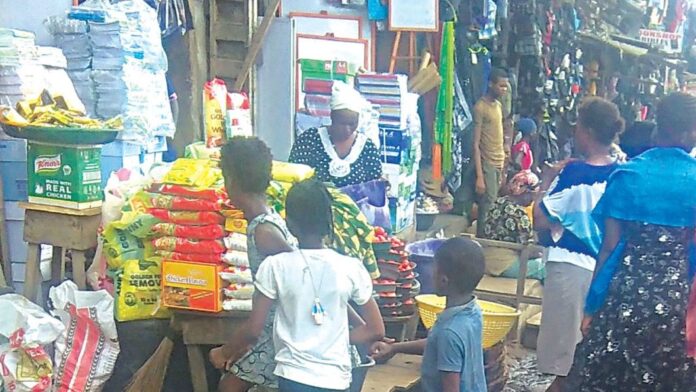Nigerians ushered into new year with additional taxes
By Jeph Ajobaju, Chief Copy Editor
High costs and low sales of commodities ushered Nigerians into the new year ahead of increased taxation and removal of fuel subsidy that could more than double pump price to N340 per litre with multiplier effects on all goods and services nationwide.
Respondents in a survey of marketets and consumers in Lagos cite, among others, inflation, foreign exchange (forex) rate, the pandemic, unemployment, and sales tax as factors contributing to the dampening of sales.
Below are the views of retailers in the survey in Ojodu and other areas of Lagos:
Esther Gbogi (trader)
“It’s low (sales), compared to other years, especially with oil, the increase in the price of oil (vegetable oil) made the demand for it to reduce.
“People that normally do hamper, gifts, the price of the oil was too much for them, that’s why they could not include oil like they did in the previous years,” she told The PUNCH that conducted the survey.
“Like beverage for example, the increment was too much that people could not afford it, so the demand reduced compared to previous years. Even during COVID-19 period, sales were even higher than this period.
“Between this year and last year, this year has been better for me, I don’t know about others.
“The margin is up to 50 per cent in increment. Oil last year was about N4,000 for Nigerian oil, but this year it is more than N6,000.
“Raw material is not available in Nigeria. The cost of bringing goods down to Nigeria and clearing them is very high. That is what is causing the increase in the price of commodities.
“Since we cannot produce most of these products, they should and reduce the import rates on the products.”
__________________________________________________________________
Related articles:
Fuel price may rise beyond N340 per litre post subsidy
Abuja’s tax plan stokes fear of business closures, job losses
Abuja cranks out more taxes for officials to steal. Literally
ICPC discovers 257 duplicated projects in 2021 budget
__________________________________________________________________
Emeka Dim (retailer)
“It has not really worked out this year, compared to 2019. Since COVID-19 things have not been the way they used to be during Christmas time. People are not buying as much as they used to.
“Before COVID business was booming. Then you could sell as much as N1.5 million, but now we hardly make N300,000.
“Like Malta Guiness, the money we used to buy 10 packs is what we are using to buy five packs. The price has doubled.
“They (customers) are complaining that they don’t have money to buy. It’s bad, all the provisions, their prices have doubled. It’s really hard.
“I have never experienced this since I came into this business in 2015. On a Christmas day, people are not buying as they used to. It is very surprising.
“It’s our government. If they plan well, people will not be suffering like this. I have stayed in other African countries. I have been to South Africa. I have been to Cameroon before I came.
“You can use the equivalent of N500 to cook over there, but here, it is very bad.
“Our security too, most of the products they used to bring from the neighbouring countries, you cannot go out from Nigeria to bring in goods as before.
“I’m not talking about smuggling but bringing goods from seaports, you can’t find it easy to get most of the products.
“They should help business people by giving them loans to boost their business like it’s done in other countries; the tax too, we are paying too much taxes. We pay this, we pay that.”
Onuegbu
“Sales are not like before this year. They didn’t move like other years. People are not buoyant, so this year’s sales have been poor. During Christmas people didn’t really buy.
“Before COVID-19 sales were very okay. Last year, some products were very scarce. You would have to get in a queue to buy some of the products. Now anywhere you go you’ll see the products, but since COVID-19 things have become expensive.
“Everything has added money. If you buy products today, the next day, they will add money. They don’t even give a gap.
“efore we were buying Milo N8000 plus, but when you get to the market now, Milo has added money, a carton of it now goes for N14, 000.People are not able to buy because products are adding money too much.
“They (wholesalers) can’t really say anything because the situation comes as a surprise to them too. Before, it took like five years before products added money but now nobody can even tell.
“When you tell them (buyers) the prices of the commodities people that have the money will buy. If they don’t have, they will go to where they can get cheaper goods.
“They are complaining bitterly, they feel as if we are the ones increasing the prices of goods. But it is the way we buy that is the way we sell. They are adding money for us, then we have to add our own to get our profit.
“The government should help us out because they are at the helm and they know what is going on. They are supposed to help us to clear all those issues that are making things difficult for us.”
Oko Eucharia
“It has not been that okay, other years were better than this year. COVID-19 has affected business, but we thank God that it is getting better unlike the first time that there was COVID.
“I can’t really say. It’s how we buy from the market that determines how much we sell. Since COVID things have really been expensive.”
Precious Nwadike
“Christmas is always better than normal days. I think last year was better than this year, but 2019 was far better than the past two years. Dollar was not really high then.
“Things were still cheaper and people were able to afford to buy more, but now prices have gone up, not everybody can afford to buy. As a matter of fact, it is not everybody that is celebrating Christmas.
“I can’t say. Maybe our leaders will be able to explain better why things are so expensive. We went to the market and came back today. Everyday things are topping up money.
“You’ll buy a product for N1,200 and by the time you go back to the market you hear its N1,500. It’s not nice.
“They’ll tell you it is dollar. They are saying dollar rate. Some companies are finding it difficult to access raw materials to produce.”
“Our customers have been complaining that things are expensive. We tell them that it is not our fault. It’s the way we buy. They complain but at the end of the day they will still come back but it is not easy. I also feel it. I’m also a customer.
“They should look into this issue of importation of goods. They will tell you, before you ship in things, the money spent would have taken everything.
“So they should look into this issue of dollar rate so that things will be easy for us. That’s what I think is the right thing to do.”
Echere Obinna
“With more than half of Nigeria’s revenue derived from oil exports, the country’s economic fortunes have become tied to the rise and fall of oil prices.
“With the attendant decline in oil prices as well as acute job losses caused by the pandemic, the earning, and ultimately the spending power of Nigerians, have taken a nosedive, thereby leading to the poor sales recorded this year.
“Economic diversification has to be taken more seriously by the government as the emerging economic reality continues to push more Nigerians into poverty.
“The coronavirus pandemic, Nigeria’s monumental debt profile, and a declining GDP [Gross Domestic Product] bring increased urgency to this issue.”













